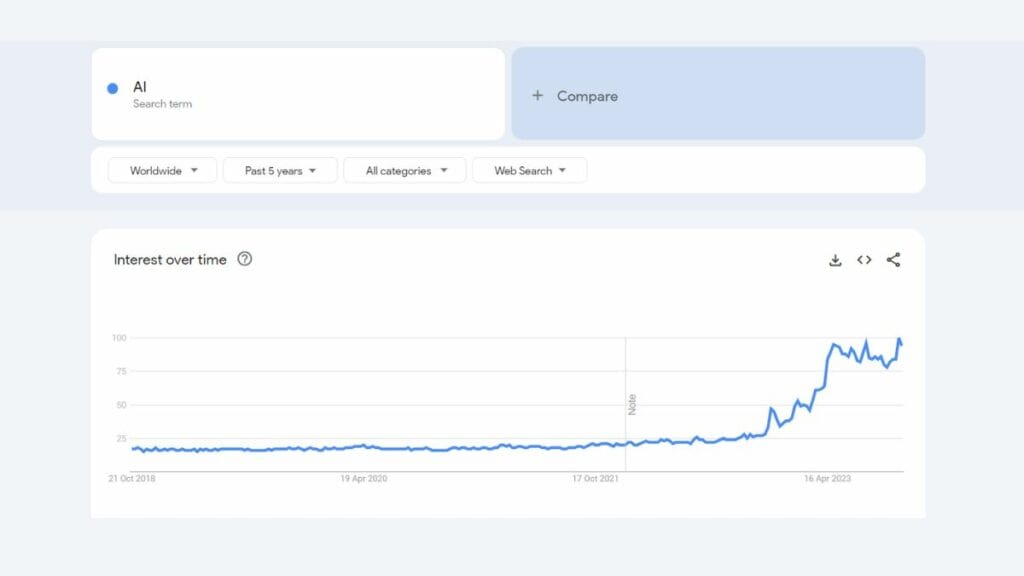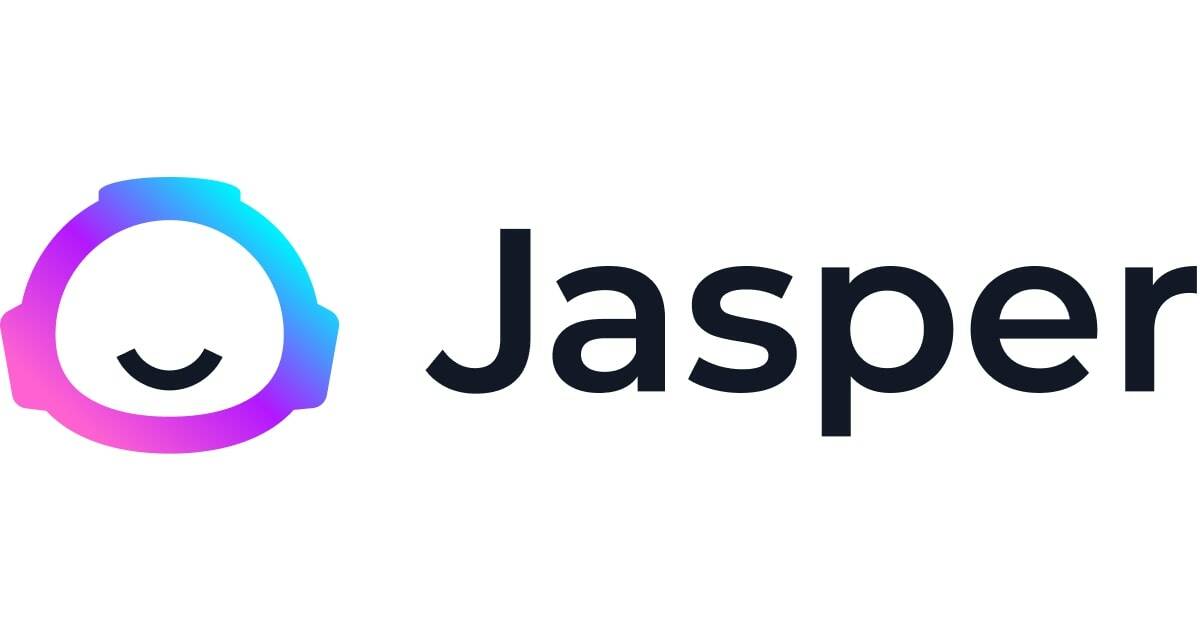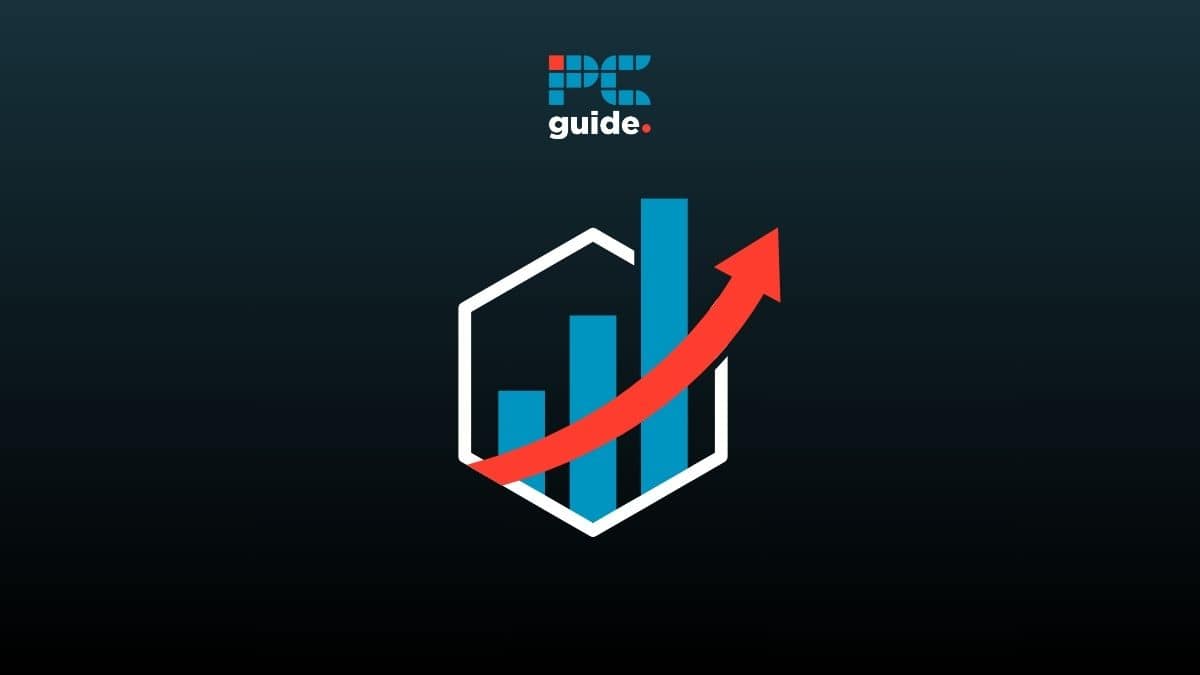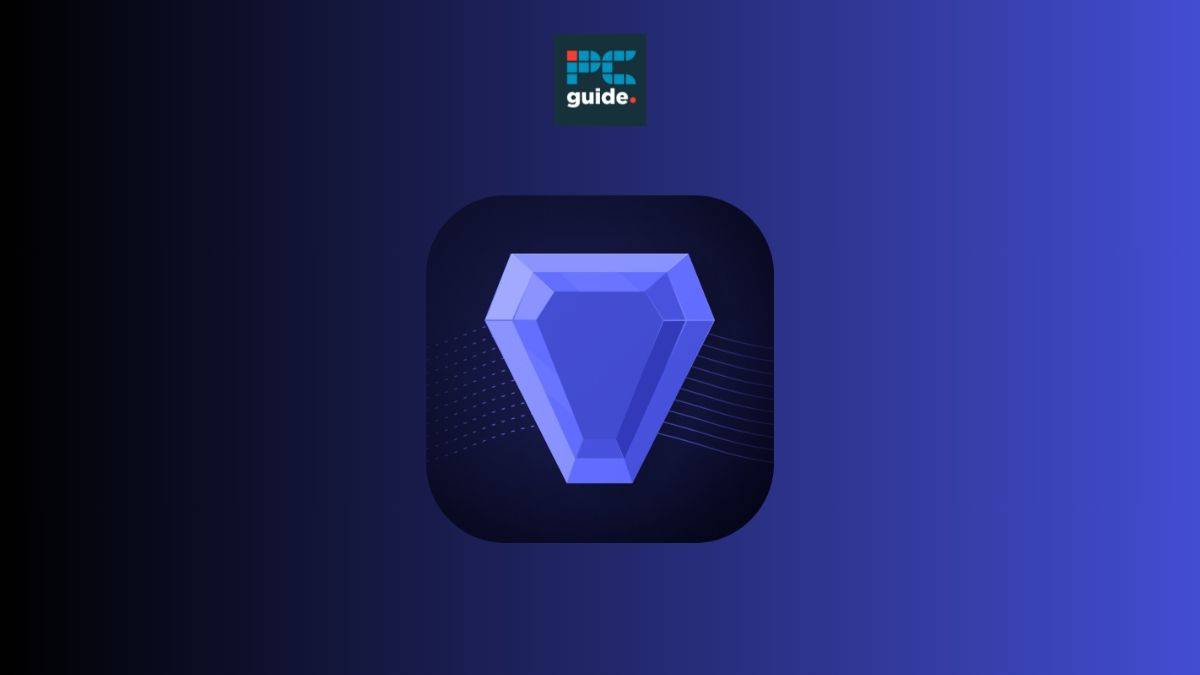We collect, and draw insights from, the top-line statistics of the global AI market in 2024. With the adoption of AI hitting an all-time high this year, new jobs have been created — and many lost. With AI-powered voice assistants in consumer mobile devices and AI chatbots like OpenAI’s ChatGPT now adopted by most customer service implementations, we already live in a very different AI technology landscape from 2022. Herein we assess the AI market size across media, healthcare, the retail industry, and more.
What are the key AI trends of 2024?
The key AI trends of AI of 2024 are:
- AI Chatbots
- Natural Language Processing (NLP)
- Large Language Models (LLM)
- AI image generators (or AI art generators)
- Text-in-image generation
- Uncanny Valley (Human faces and hands mostly solved)
- Ethics of deepfake technology
- AGI (Artificial General Intelligence)
- Mass education on the topic of AGI and machine learning
- Alignment research, safety, and ethics
- Multimodality (Most chatbots are now multimodal)
- Computer vision (e.g. Self-driving cars)
- The economic and human impact of AI
- Job redundancy due to AI
- Newly invented job roles
- AI in healthcare (esp. genome research, molecule discovery)
- AI in material science
- AI Hardware (esp. AI assistant wearables)
The key AI trends of 2023 were:
- AI Chatbots
- AI tops the charts for mobile apps (esp. ChatGPT, Character AI)
- Natural Language Processing (NLP)
- Large Language Models (LLM)
- Internet accessibility and third-party plugin integration
- API access (esp. GPT-3, GPT-3.5 Turbo, and GPT-4)
- Use of AI in customer service
- AI image generators (or AI art generators)
- Integration of image generation into AI chatbots
- Uncanny Valley (Human faces and hands mostly unsolved)
- Open-source AI software code from big tech
- AGI (Artificial General Intelligence)
- Alignment research, safety, and censorship (Frontier Models Forum formed, inaugural UK AI Safety Summit)
- Multimodality (Most chatbots weren’t multimodal)
- Computer vision (e.g. GPT-4V)
- Mass education on the topic of AGI and machine learning
- The economic and human impact of AI
- Audio deepfakes of popular music artists (esp. Drake)
- AI Hardware (esp. NVIDIA graphics cards)
- SAG-AFTRA strike
What is the global AI market size?
The global AI market is currently valued between $208 – 241 Billion USD. This is expected to rise to $15.7 Trillion USD by 2030. The most conservative estimates account for a compound annual growth rate of 17.3%.
While this is bold and bullish predicted, the pervasiveness of this technology cannot be understated. Even measured by today’s use cases, only 35% of businesses have adopted AI according to IBM, meaning that adoption has room to almost triple. This is projected to include a $1.25 Billion global valuation of AI chatbots by 2025.
Constant innovation in the AI space sees each year’s prediction bolder than the last – with AGI now predicted to arrive 13 years earlier than the aggregate opinion collected during 2022.
What effect will AI have on jobs?
AI is predicted to make 85 million jobs redundant by 2025, replacing them with 97 million new roles. This is on an even larger scale than the Industrial Revolution, because there are more jobs today, with more people working, and of course more people in total.
Employees who retain their employment status into the new year may still find their roles augmented by AI. Automation of tasks, interactions, and collection of resources is set to boost the productivity of professionals across many, if not most, industries. AI models can perform many tasks faster, more cheaply, and with less error than human professionals. Those tasks that can’t yet be automated may only be one AI model update away. Data analysis and customer service are principally among those that can be automated with a reduction of both cost and human error.
How fast is the economy adopting artificial intelligence?
Artificial intelligence stats show AI adoption rates are gaining faster than almost any other market sector, and are “expected to grow twentyfold by 2030, up to nearly two trillion U.S. dollars” as predicted by Statista. A study published by Statista this year shows that the adoption of AI in businesses across all industries has grown from around 20% to over 50% in the past five years.

On the topic of uncanny valley, human faces and hands, in addition to text, have been the final frontier of AI-generated imagery. For the majority of 2023, hands would be generated with 4 to 7 digits. Similarly, crossed eyes, too many teeth, and blurry faces have been common issues. These challenges have been solved to a satisfactory degree by only two AI image generators — namely Midjourney and DALL-E 3 (Stylized DALL·E 3). As a result, Bing Image Creator, which is “powered by DALL·E 3”, has identical quality and use cases as the latter.
Which chatbot can use text, audio, images, and video? — Multimodality
Multimodal AI is artificial intelligence that can accept inputs of, translate between, and output multiple types (or modes) of media. These types of media are text, image, audio, and video — which is the order of complexity for achieving this goal. At present, no company on earth has a unified AI with multimodality across all four digital media verticals.
Essential AI Tools

Content Guardian – AI Content Checker – One-click, Eight Checks

Jasper AI

WordAI

Copy.ai

Writesonic
What are the biggest companies in AI? – Microsoft vs Apple
Microsoft briefly overtakes Apple as the world’s most valuable company on strong AI results. As the Windows giant continues to push the market of generative AI, Microsoft dethroned Apple in the second week of 2024, climbing to an estimated valuation of $2.903 trillion. This is an increase of over $400 billion since 3 months prior.
To exemplify how significant artificial intelligence has become in just the past year, we can compare it to the global economy without even dwarfing it. At the time of writing, there are just six companies with a valuation of (or exceeding) $1 trillion USD — with the newest entry hitting that milestone because of AI.
For clarification, that’s six companies anywhere in the world. However, we’re only drawing from a list of publicly traded companies, as it becomes much harder to evaluate a company’s valuation if no shares are publicly listed on a stock exchange. This means that there could be more than six, but we wouldn’t know for sure.
| Company | Market capitalization (Billions of USD) |
| Apple | 2,758 |
| Microsoft | 2,487 |
| Saudi Aramco | 2,155 |
| Alphabet | 1,776 |
| Amazon | 1,341 |
| NVIDIA | 1,049 |
Meta Platforms Inc, Tesla Inc, and PetroChina have each previously hit the milestone, dipping since then to approximately $830B, $791B, and $178B USD respectively (October 2023).
By contrast, there are 134* companies with a valuation of or exceeding $100 Billion USD, with a large number quietly or publicly investing billions into AI research and development.
*This figure, of course, could change every day.
Google AI – $1bn (£789m) UK data center announced at WEF (World Economic Forum)
Google announced at the recent World Economic Forum that it would be building a new data center in the UK, amounting to a £789 million investment. The new facility will create jobs, support demand for Google Cloud & AI services, and accelerate the development of proprietary artificial intelligence such as LLaMA 3. It will be located at Waltham Cross in Hertfordshire, on a 33-acre lot, and add to the 7,000 people Google already employs across the UK.
IBM AI – $500M Enterprise AI fund
IBM (International Business Machines) has announced an Enterprise AI fund, with an inaugural allocation of $500M USD. The fund will be used to invest in both early-stage startups and established enterprises with high growth potential. This fund and others like it will have a significant impact across the economy, encouraging fresh ideas and incentivizing existing businesses to develop generative AI. Businesses that IBM chooses to invest in will effectively be incubated by an internal team of scientists, guiding the startup through the technical and philosophical challenges of safe and effective AI development. With a historical precedent in computer science and enterprise-grade AI, the IBM Enterprise AI fund may come to be revered similarly to Y Combinator.
Microsoft AI – Microsoft 365 Copilot Early Access Program
Copilot, Microsoft’s AI solution for productivity software, has begun rollout to the 365 suite of office apps as of November 1st, 2023. The deep learning artificial intelligence, dubbed Microsoft 365 Copilot, has been accessible by invitation only to 600 corporate clients since May, via the Microsoft 365 Copilot Early Access Program. This same functionality is expected to complete rollout to all 365 customers by the end of the year.
The integration of AI into a market-leading software product business is predicted to extend Microsoft’s market share to an all-time high. Where “Office applications contribute 24% of Microsoft’s total revenue,” this is looking promising for investors, considering that the category as a whole “grew 16% in the fiscal fourth quarter, more than 30 years after the company began offering the bundle,” via CNBC.
Amazon AI – Amazon Olympus LLM rumors
The e-commerce and cloud computing tech giant is rumored to be developing a ChatGPT competitor codenamed Olympus. The Amazon Olympus LLM will reportedly feature “2 trillion parameters”, which is double that of OpenAI’s GPT-4 foundation model. It may even be more powerful than the brand-new GPT-4 Turbo upgrade announced this month at OpenAI DevDay. Either way, it will soon be powering Alexa AI, which will in turn objectively become the most intelligent voice assistant (at least in natural language processing capabilities).
As a result of its AI push, Amazon shares jumped by over 7% on October 27th, 2023.
Microsoft overtakes Apple to become the world’s most valuable company on AI rally
Microsoft has overtaken Apple as the world’s most valuable company, on the back of excellent AI results. The history rally sees MSFT surpass the $3 trillion milestone – the second company ever to do so, after Apple.
Considering its substantial successes in AI as well as VR and cloud computing, Microsoft has posted revenue growth of 20% for multiple consecutive quarters. This growth is monumental for a company the size of Microsoft, and CEO Satya Nadella is sure to be celebrating as we speak.
MSFT stock value has also seen an incredible 60% increase since the release of ChatGPT in November 2022. These two things are closely linked, considering the partnership between Microsoft and ChatGPT developer OpenAI, which sees the former using the technology of the latter to power the Copilot AI assistant.
NVIDIA AI hardware in 2024 – The H200 GPU supply shortage
PCGuide named NVIDIA as the key hardware manufacturer of AI of 2023. It earned this distinction by becoming the world’s highest-grossing vendor of hardware specialized for AI, and crossing a $1 trillion market cap as a result. This is largely due to the H100 and H200 processing units. Meta recently became the largest customer of these chips, with an order of 350,000 units. Even at wholesale, it is projected that the purchase cost in excess of $10 billion.
All this processing needs to happen somewhere, and right now that’s NVIDIA GPUs (Graphics Processing Units). The existing hardware, designed to produce the visuals you see on your computer screen, also happens to be more effective for typical AI processes than other types of common PC hardware. This is of course music to the ears of NVIDIA CEO, President, and Founder Jen-Hsun “Jensen” Huang (黃仁勳 in the original Mandarin).
This year, the graphics chipmaker has excelled in the research, development, and implementation of AI systems. Such technologies include DLAA “Generative AI anti-aliasing” on the software side, as well as hardware like the GH200 ‘Grace Hopper’ AI superchip. This in addition to a partnership with cloud data infrastructure firm Snowflake, prompted a similar move from hardware rival AMD in the acquisition of Nod.ai.
Huang, an American-Taiwanese businessman and electrical engineer, has grown the corporation since 1993, as well as his personal net worth to over $41 Billion USD. NVIDIA most recently saw a surge in stock value during 2021, when “the cryptocurrency boom drove up usage of its chips for mining”. While we can’t explicitly call him the first AI billionaire (having been a billionaire before AI was the “it” tech) it has further secured his place as one of the wealthiest people in the world.
FAQ – The most frequently asked questions in AI economics
If you have a question of your own, ask us on X (formerly Twitter) @pcguidedotcom and we might consider adding it here!
Who is the largest patent holder of AI patents worldwide?
Baidu holds the highest number of patents of any entity worldwide. The tech giant specializes in internet services, such as the most popular search engine in China. Founded in 2000 by CEO Robin Li, and Chairman of Yifang Capital, Dr Eric Xu, Baidu has been investing in artificial intelligence since 2010 and now holds proprietary AI technology such as Baidu Brain.






